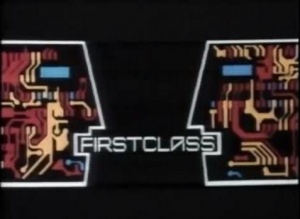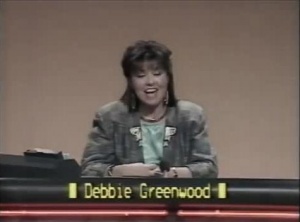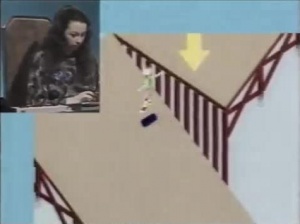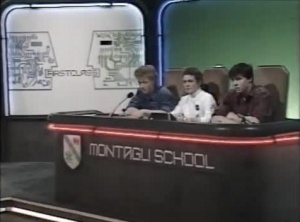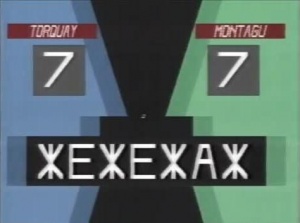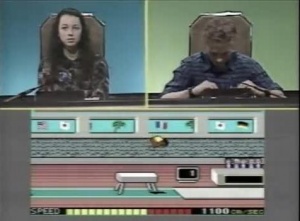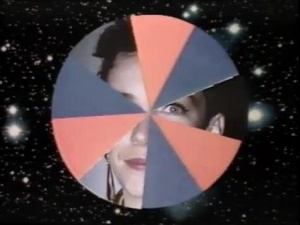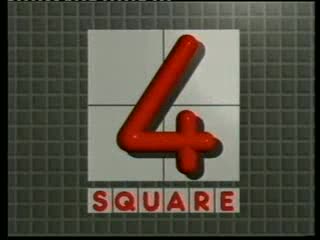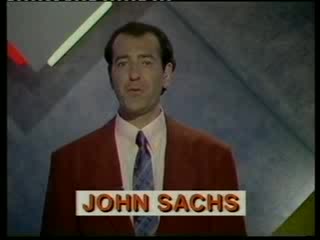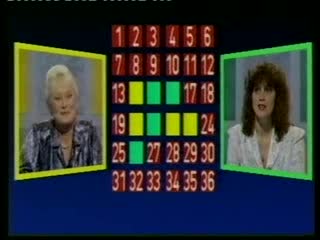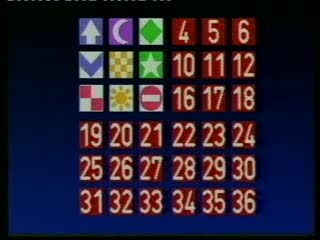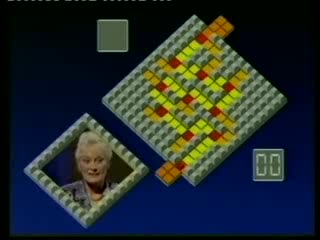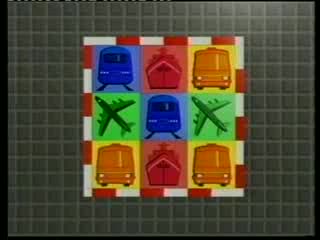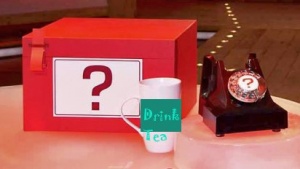Weaver's Week 2012-08-12
Last week | Weaver's Week Index | Next week
Eugene ready?
Contents |
First Class
BBC Scotland for BBC1, 1985-8
Oh, there's a blast of nostalgia! The painting of a printed circuit to form a face, while Mike Oldfield's "Platinum" revolves in the background. (The only version we can find to buy is the double CD*.) It's First Class, the video quiz, hosted by Debbie Greenwood. In the sample episodes we've got – both from the 1988 series – she's trying to look cool, in fashionable jackets, and is almost succeeding. She promises to see how good the teams are at video games, and will be testing their knowledge of pop, news, and sport.
There's the briefest of introductions – "from Torquay Grammar, it's Amanda, Sarah, and Alex" – the cheering from the supporters takes longer. And confirmation that the First Class microcomputer, Eugene, is ready.
Into round one, the skateboard park from Atari 720. The objective here is to get from the top of the slope to the bottom, navigating the turns and trying not to fall into the water, because that costs time, and the points go to whoever's faster. Players can pull tricks, do ollies or sidesplits or turbo-cruises, but the game's scoring isn't used – it's only pure speed that counts.
Debbie delivers a breathless commentary, calling out exactly what's on screen in front of her: a very small figure that might be a skateboarder, travelling down a diagonal path. Two points for the winner, and we're slightly worried by how all the Torquay supporters look exactly the same.
Into round two, and remember how this is The Video Quiz? Debbie introduces a clip from a recent movie, one now available on home video. We need to explain this concept to younger readers. Before people leeched their AVIs from warez sites, video was distributed via disks called "DVDs". Those were a development from the video cassette, which held video as magnetic encoding on a long strip of tape, and read it by moving the tape to and fro along a spool against rotating detection equipment. The tape was held in a plastic box about the size of three piles of three smartphones laid side by side. The capacity of a video cassette was about the same as a basic smartphone.
"What movie was this from" is Debbie's perpetual opening question. No-one remembers that it's from "When Harry Met Sally"*, which surprises us, because it's a movie that even we've heard of, and we so don't do movies. Four questions in this round, all on the buzzers, and no conferring allowed. Two points for a correct answer, and at the end of the round Debbie will ask Eugene for the scores. Eugene displays the scores, while humming another bit of "Platinum".
Into the Video News round (hey, this is The Video Quiz, and we don't get to forget it): a clip made for the news in late 1987, and chosen so that it would still look sensible some months later. So we get footage of a really old car that's never been driven, and Kate Adie reporting on the speed of a trireme. You know, a ship used by the ancient Greeks. Three questions for each team, and it's clear that this is the observation round – all the queries come from the commentary in the clip.
"We really get going now" says Debbie, suggesting that the first seven minutes were completely pointless. Just because the scoreboard says that, for one of the teams, the first seven minutes really were completely pointless... A series of questions on the buzzer, two points for a correct answer. The round includes some clips of pop songs, during which Debbie does some rather dodgy chair dancing, and the stumper:
- Q: Bill Giles, Michael Fish, and John...
- A: Weathermen
Ooooooh! Debbie tells us who buzzed in with the identifier: "Torquay, Alex". If they're looking for a new announcer at Granada Towers, she's available. Back in 1987, it was possible to ask questions to teenagers about just about any record in the top 40 – one round covers the credible dance music of Jellybean and the AOR of Simply Red. These days, there are fans of "proper" music, and fans of improper music. It seems that no two people agree on what is "proper" music, though we hope all agree that Chris Brown's criminal record is improper.
Next up is "Word of Mouth", where there's a word hidden in Eugene's mouth. This is, basically, a round of hangman played using the names of countries. The teams guess a letter, and if it's in the word, they see where it is. If it's not, they lose a point – whatever's left when they guess the country is credited to their score.
Back to the arcade for the spring and vault game from Konami's Hyper Sports, where the players' avatars run up to a springboard, jump on it, vault onto a vaulting horse, and hope to turn somersaults in the air. Bonus points for height and lots of somersaults, points deducted for not landing on one's feet, and there's no score for completely botching the vault. Two goes at this, and lots and lots of button-jabbing while the somersaults are turning. And, no, we don't know why the avatars always end the vault by scratching themselves.
Pop videos next, one for each team, and three questions about the performer, the song, the video. Then it's the Spinning Golden Disc, which is basically hangman played with pop stars' faces. The disc is divided into three colours; the team picks a colour, and those segments are revealed. If they need more of the face to identify the musician (or Phil Collins), it'll reduce their points. And if the team gets Linda Ronstat, they're doing very well.
It's back to the skateboards for a second run, this time involving some water jumps. And the show finishes with another general knowledge round, this one asking the prescient question, "Which record did Ben Johnson break..?" Most obviously disgraced sportsman in world history, if we're not mistaken – Zinedine Zidane holds the European record these days.
So the last few minutes are derivative of rounds we've already seen. This isn't so bad. First Class is an entertaining and inventive show. It's obviously been given a children's department (read: small) budget, but has eked it out with careful planning. A few clips, some simple visual effects, and computer graphics and games that are very much of their era. Debbie Greenwood keeps the programme ticking along at a lovely pace – the show tests all sorts of knowledge and it never feels rushed.
First Class usually went out at 5.35 on midweek evenings, bridging the gap between children's television and the grown-up schedule. Neighbours barged into this slot at the beginning of 1988, and wouldn't leave for two decades. This series dribbled out over Saturday teatimes during the summer, and we've not seen it since. A shame: it would be good to have a younger, hipper counterpart to University Challenge.
4 Square
BBC1, 1988-91
"Younger" and "hipper" are two words that we don't generally associate with 4 Square. But we were somewhat surprised to find out that over 300 people had gathered in London last year to play a game, or probably a series of games. What's going on?
It could be the theme music, lively and purposeful, fitting with the images of travel – trains and boats and planes and coaches – shown during the opening titles. Or it could be that the attendees were all fans of host John Sachs, always equipped with a self-deprecating putdown. Yes, he went on to provide the commentary for Gladiators, but this was his moment in the host's chair.
We hope that the people weren't crowding in for the first round, the picture spin quiz. Contenders will pick squares on the board. They'll spin out, and reveal a picture, and John will ask a question about the picture. Get it right, and the player keeps that square: get the question wrong, and it goes to the other player. One point for each square, and a bonus of five for a 4 Square – four little squares into one big square.
Each contender was given four free moves (and four points) to start, and this actually gave the first player a huge advantage. With only the most basic strategy, the first player is able to arrange their squares into a contiguous block, while the second player has to dart about to block the first and can't get anything going on their own account. Only when the first player makes an error – not all that easy, given the fairly easy questions – can the second player claim the advantage. To help speed up the round, and rotate the advantage, both players will pick two Gremlins, frowny little squares that automatically go to the opponent.
The first round continues until neither player can make another 4 Square, this usually leaves four or so squares untouched. We're then straight into round two, Pair the Squares. There are nine symbols used here – an upwards arrow, a downwards chevron, crescent moon, diamond, star, sun, no entry, chessboard, and a quartered pink-and-white symbol known as "The Battenberg" after John's favourite type of cake. Are we to think that 300 people turned up in their favourite Pair the Squares symbol? Perhaps.
Each symbol is hidden under one of the squares in each quarter of the board. In turn, the players will call out four numbers. If they can match a pair, those symbols will disappear from the board, and turn into their colour. They'll score two points, and the bonus five for a 4 Square. But, if the symbols don't match, they'll be concealed again before the other player has their turn.
This is a simple test of memory, and we can expect the contestants would clear the board within about twelve goes each. But the producers have a trick up their sleeve: after four goes each, the bell rings and the round is paused.
Before it continues, the players will play the maze. Here, John will read a series of true or false statements. The players will respond by calling out "True" or "False", and pressing the corresponding button on the panel in front of them. Their progress is marked by a counter moving through a labyrinth, at the rate of one square per second. If the contender gives a correct response, the counter picks up the trail behind it, and moves on. But if the player gets the statement wrong, or gives no answer in five seconds, the counter disappears up a blind alley. One point for each statement correctly resolved, and the faster player to complete the course gets a "what word goes before / after these words" for a whopping ten bonus points.
We don't remember the round for John's stumbling delivery: at least once in each round, he won't complete the statement before the five seconds are up. Nor do we remember it for the computer visuals – they were adequate for 1988, and were becoming very dated by 1991. No, we remember the maze round for one thing, and one thing only.
We remember the maze for the music. It starts gently, and slowly increases in speed, and increases in intensity, until finishing with a great fanfare. And it's a fanfare we hope not to hear the end of, because that would mean the contestant has failed. Best game show music ever? It's up there with the theme from Interceptor and the suites from Fort Boyard and Who Wants to be a Millionaire.
We can just imagine a flashmob of 300 people turning up, some of them in costume (as sunshine or The Gremlin, and holding some battenburg cake) for the sole purpose of singing the music to the maze. And then dispersing. This column has some strange dreams.
Back in the game, the memory round resumes, and is played to its natural conclusion, ending when there are two or four squares left. The winner of each game moves on in the series, the loser goes home with no consolation prize – and, thanks to the way each is stuck in their own little box, not even a handshake from the winner. The series is a five-round knockout, in which 32 players are reduced to one winner. There was an unusual level of honesty in the transmission order – the winners of first-round matches on Monday and Tuesday would play their second-round match that Wednesday, so that only the winner would need to come back for the quarter-finals.
The winner's prize is 4 Square miles – they'll add up the points they've scored in their five victories, and play the maze one last time. Those points are multiplied by their score in the maze, so the winner would typically go on a holiday with about 3500 miles – not quite a round-the-world cruise, but certainly enough for the Med, much of Africa, or just about the Caribbean.
Would 4 Square work today? It might do, we're slightly surprised that the low-budget satellite channels haven't considered making the show again. Certainly they'd need a genteel host, John Sachs was able to put the players at their ease, and it really showed that everyone concerned was having a fine time.
This Week And Next
Answers to the First Class questions: the country is Senegal, the pop star is Annie Lennox. Eleven points if you got both parts.
Mastermind returned this week. As with University Challenge, we're going to give brief recaps of the early stages, only moving to full reviews for the second phase.
- Rosalind Winter (specialist subject: the completed novels of Jane Austin) scores a near-perfect 15 points (0 passes). Her general knowledge round isn't of quite such a high standard, ending on 24 (4).
- Nathan Joss (the life and times of Elizabeth I) also scores strongly, 13 (0). His general knowledge does not include Keith Lemon, which is a good thing, and ends on 26 (3).
- Gregory Spiller (Fawlty Towers) has a fault-free round, 16 (0). His second round includes "bilge", but only as an answer, finishing on 32 (3).
- Chris Cann (Savoy operas of Gilbert and Sullivan) also does very well, 16 (0). His general knowledge set begins very slowly, but picks up speed to finish on 29 (2).
So Gregory Spiller books his place in the second round. Chris Cann is likely to come back as one of six high-scoring runners-up.
While the rest of the country was watching Andy Murray fail to be the second-place winner at the Wimbledon 750 ATP event, Channel 4 was holding a philosophical discussion. If someone wins £250,000 on Deal or No Deal and no-one watches it, can they be called a winner?
Deal or No Deal began a product placement deal this week. Shots of the host and contestants drinking from the programme's mugs have been altered in post-production, so that they appear to be drinking from mugs emblazoned with a well-known variety of tea. The general reception is that this might make business sense, but it looks rubbish on the telly – the digital altering makes the picture look poor.
24.24. Twenty four point two four million people. That's the rating for the Olympics 2012: Opening Ceremony programme on 27 July. It's about nine Celebrity Juices, about thirty Only Connects, and one hundred times the audience for that night's Million Pound Drapp.
But it's not the week's top-rating game show, because it's not a game show. That honour goes to ITV's Superstar, where 3.1 million people saw R Ben crowned as the winner. University Challenge came in second, with 2.3m viewers. Third place for Tipping Point on ITV, 2.15m people saw Thursday's episode, and we hope that Ben Shepherd's excitable commentary on bits of falling plastic may be back. Come Dine With Me led for Channel 4, 1.4m there. Big Brother peaked on Thursday with 1.55m; Friday's eviction show still made a million when catchup viewers are included. That's four Million Pound Drapps.
Elsewhere, a very healthy 665,000 for Hell's Kitchen, 400,000 for Sunday's Come Dine on More4, and 390,000 for Britain and Ireland's Next Top Model on UK Living. Elsewhere, Comedy Central Extra has picked up The Daily Show; 45,000 people tuning in makes it as popular as The Two Hundred Grand Drapp.
The new season of game shows starts next weekend, but some shows are getting in early. New episodes of Pointless (BBC1, 5.15 weekdays), a new run of Celebrity Masterchef (BBC2, 6.30 weekdays), and a new challenge of The Great British Bake Off (BBC2, 8pm Tuesday). There's also the final of Civilian Big Brother (C5, 9pm Monday) and the launch of Celebrity Big Brother (C5, 9pm Wednesday), and Peter Andre's Bad Boyfriend Club (ITV2, 9pm Wednesday), but we include those purely for completeness. Next Saturday has the beginning of the end of Total Wipeout (BBC1, 5.25), the return of The X Factor (ITV, 8pm), and Red or Black? 2.0 (ITV, 7.15 and 9.15). You lucky people!
To have Weaver's Week emailed to you on publication day, receive our exclusive TV roundup of the game shows in the week ahead, and chat to other ukgameshows.com readers, sign up to our Yahoo! Group.

